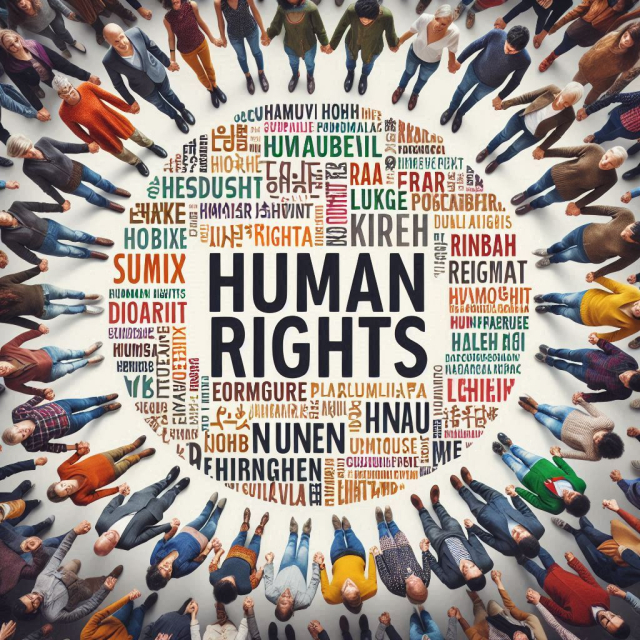Human rights are a set of universal principles and norms that establish the fundamental rights and freedoms of all people, regardless of their ethnic origin, nationality, gender, religion, sexual orientation or any other status. In this article, we will explore human rights in depth: their definition, their evolution throughout history, their importance in modern society, and the challenges they face today.
Definition and Fundamentals.
Human rights are based on the fundamental idea that all people are born free and equal in dignity and rights. These rights are inherent to the human condition and are inalienable, that is, they cannot be taken away or denied under any circumstances. Human rights encompass a wide range of freedoms and rights, including:
- Civil and political rights, such as freedom of expression, the right to life, freedom of association and the right to a fair trial.
- Economic, social and cultural rights, such as the right to work, the right to education, the right to health and the right to an adequate standard of living.
- Collective rights, such as the right of people to self-determination and the right to a healthy environment.
Historical evolution.
The idea of human rights has deep roots in human history, but its development as a universally recognized concept is relatively recent. Over the centuries, different cultures and civilizations have articulated principles of justice and human dignity, but it was in the 20th century that human rights began to be codified in international legal documents.
One of the most important milestones in the history of human rights was the adoption of the Universal Declaration of Human Rights by the United Nations General Assembly in 1948. This declaration establishes basic human rights that are considered universal and inalienable and has served as inspiration for the development of numerous international treaties and conventions on human rights.
Importance in Modern Society.
Human rights play a crucial role in modern society for several reasons:
Protection of Human Dignity.
Human rights protect the intrinsic dignity of each person by recognizing their equality and value as a human being. This implies that all people must be treated with respect and consideration, regardless of their origin or condition.
Guarantee of Freedom and Justice.
Human rights guarantee that all people have access to freedom and justice. This includes rights such as freedom of expression, freedom of religion, the right to a fair trial, and the right to participate in the political and social life of your community.
Promotion of Human Development.
Human rights are fundamental for integral human development, since they guarantee that all people have access to decent living conditions and opportunities to develop their potential in all areas of life, including education, health, work and life. participation in cultural and social life.
Promotion of Peace and Solidarity.
Human rights promote peace and solidarity by recognizing the equality and interdependence of all human beings. By ensuring that all people have access to their fundamental rights, more just, equitable and peaceful societies are built.
Challenges Today.
Despite their fundamental importance, human rights face a number of challenges today:
Human Rights Violations.
In many places in the world, human rights are systematically and widely violated. This includes violations such as racial discrimination, torture, repression of freedom of expression and the right to peaceful assembly, and lack of access to basic services such as health and education.
Inequality and Discrimination.
Inequality and discrimination are major obstacles to the full realization of human rights. Marginalized people and groups, such as women, ethnic minorities, indigenous peoples, people with disabilities and LGBTI people, often face barriers to accessing their fundamental rights due to discrimination and social exclusion.
Threats to Democracy.
The erosion of democracy and the rule of law in many parts of the world represents a threat to human rights. The concentration of power in the hands of authoritarian regimes and the lack of strong democratic institutions can lead to the violation of human rights and impunity for those who commit abuses.
Humanitarian Crises and Armed Conflicts.
Humanitarian crises and armed conflicts have a devastating impact on the human rights of those affected. Violence, persecution and lack of access to food, water and shelter are just some of the ways in which human rights are violated in crisis situations.
Protecting and Promoting Human Rights.
Despite the challenges they face, it is essential to protect and promote human rights at all times. Here are some ways we can do it:
Defense of human rights.
The defense of human rights is essential to protect the rights of vulnerable people and groups. This includes the work of human rights organisations, defenders and activists who advocate for respect for fundamental rights in all parts of the world.
Education and Awareness.
Human rights education and awareness are crucial to promoting a culture of respect and tolerance. This includes the integration of human rights education into educational systems, as well as public awareness campaigns on human rights issues.
Strengthening Democratic Institutions.
Strengthening democratic institutions is essential to protect human rights and prevent abuses of power. This includes the promotion of judicial independence, freedom of the press and citizen participation in political decision-making.
International cooperation.
International cooperation is essential to address global human rights challenges. This includes joint work between governments, international organizations, civil society and other actors to address issues such as poverty, inequality, discrimination and armed conflict.
Human rights are fundamental to ensuring dignity, equality and justice for all people around the world. Although they face significant challenges, it is essential to continue working to protect and promote human rights everywhere. By doing so, we can build a more just, peaceful and equitable world for present and future generations.
